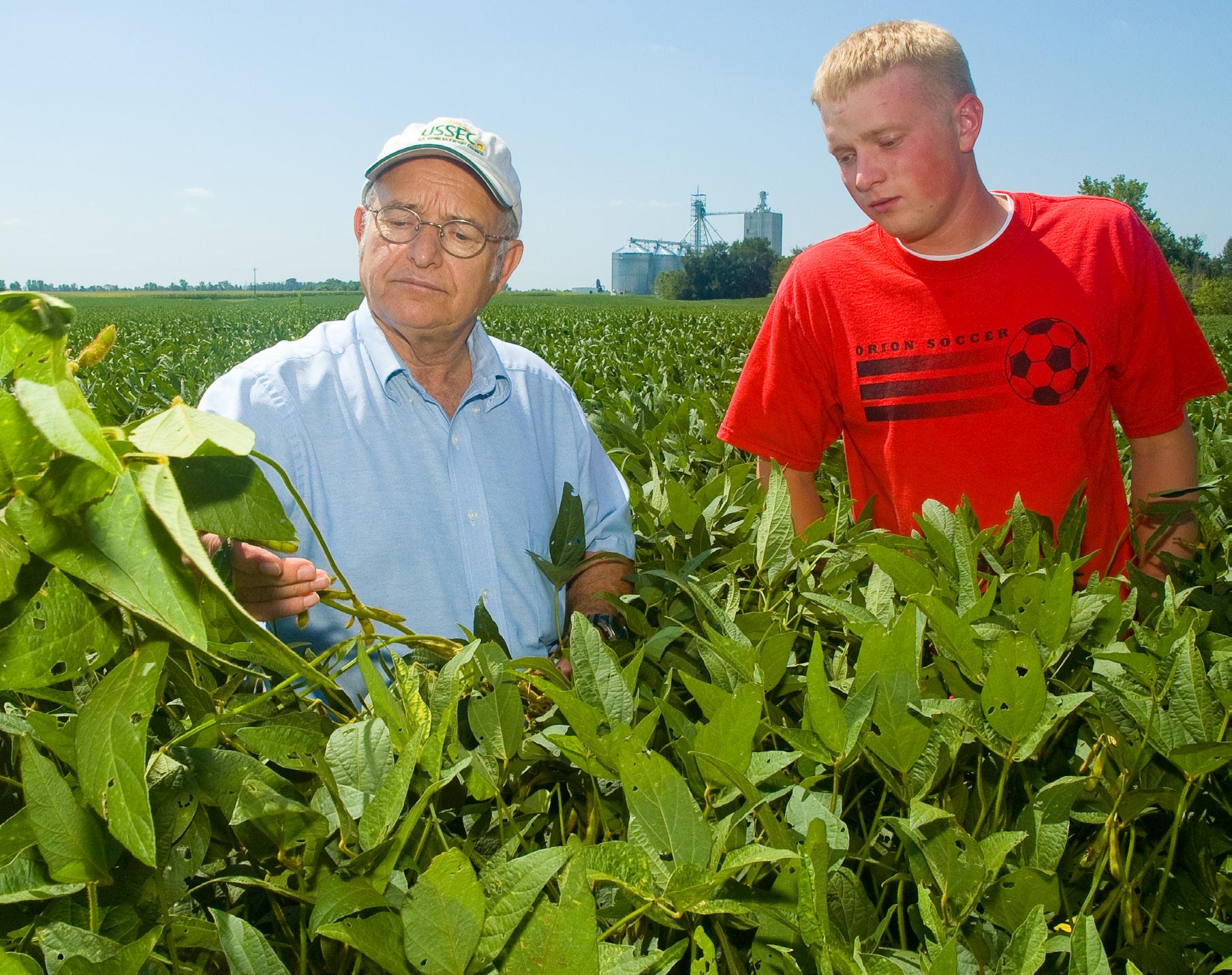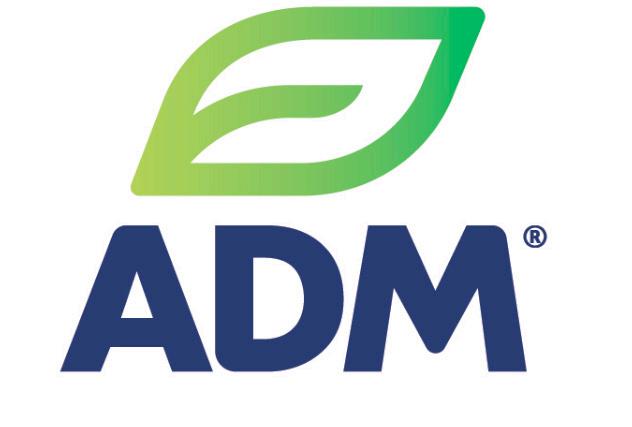
6 minute read
Every farmer has a story
Phil Bradshaw is a friend of soy. This is his tale of loyalty, dedication and a passion for the almighty soybean.
By Rachel Peabody
Advertisement
The commodity checkoffs, and especially soybean, certainly found a friend in Griggsville, Ill., farmer, Phil Bradshaw. He’s devoted more than 60 years of his life to the advancement of agriculture through his involvement with commodity boards. He’s devoted, he’s passionate, he’s caring, and above all, optimistic about the value of checkoffs and the strong future they ensure for the industry.
And to the Illinois Soybean Association? Phil is a good friend indeed.
Bradshaws and their soybeans
Phil recalls his grandfather, S.S. Bradshaw, growing soybeans on their farm as early as the 1910’s.
“Growing soybeans at that time in the U.S. was almost unheard of. Very few farmers were trying it yet, and there hadn’t been much success with the crop at that time. My grandfather was growing them as a source of protein for cattle and he fed them as loose hay,” he says.
The Bradshaws got more involved with soybean diversification on their acres when Phil joined the family farm in 1963, a few years after he had graduated with an ag degree from Western Illinois University.
And the reasons why were simple.
“The price was attractive, it gave me a crop rotation, and I needed the nitrogen for our soils,” he says. “In 1963, we only had about 20 acres of soybeans on our farm and I grew it from there.”
Aside from growing soybeans, Phil found himself buying a semitruck load of soybean meal every three weeks to feed to his budding hog operation.
“Buying the quantity of meal that I did to feed our hogs really got me thinking about the soybean industry and the versatility of the crop. Animal ag was, and continues to be, the No. 1 customer, but back then we were just starting to learn about its uses in soybean ink and crayons, and you could say I was inspired. I wanted to be a part of growing that industry,” he says.
Phil Bradshaw on the farm this past fall. “I always thought farming was my best opportunity,” he fondly recalls. An early supporter of commodity checkoffs
Bradshaw recalls a time when he was at the ground floor of building state commodity groups.
“Back in the late 60s and early 70s, myself and some other farmers thought it was time to start promoting our products," he says. "In 1968, I got involved with our local pork voluntary checkoff. At that time, Pike County was the largest pork producing county in the state. But starting a checkoff wasn’t every farmer’s priority. I remember being a young guy in my 20s and other farmers giving me a hard time for believing in a checkoff.”
Bradshaw went on to serve on the Illinois Pork Producers Association (IPPA) board. He served as their board chairman for three years starting in 1969.
When the Illinois Soybean Program Operating Board (ISPOB) was established in the early 1970s, Phil was involved from the beginning. He’s twice served as a director through the years, including leading the organization as board chairman. During his second board stint in the early 2000s, he became more involved with the national checkoff, the United Soybean Board (USB), and went on to serve as their chairman in 2010.
Of all of the work that he’s touched in his storied checkoff career, he’s most proud of the Illinois soybean checkoff funded soy-fed shrimp research at Texas A&M University.
“Most people don’t think of soybean farmers caring about raising shrimp in captivity, but, at the end of the day, that was a market for us. This TAMU research project made soy-fed shrimp a reality. Those advancements in shrimp production made it a product that could be enjoyed by all, not just a few people. Every person around the globe can enjoy the benefits of that research today,” he says. “The soybean farmer put up the money to make that a reality and it changed consumer access to shrimp entirely.”
This example is proof of what Phil calls his “favorite bold statement” to make today.
“I’ve been saying it for years, and I talk about it in my book, 'Your Food My Adventure: One Farmer's Journey to Feed the World.' Nobody in the developed world spends a day where they don’t benefit from a commodity checkoff program,” he says. “It’s nearly a billion dollars spent every year that farmers across the coun-
try contribute, in all segments of the ag industry, to promote their products, support research, and develop new uses. It’s a testament to the commitment from farmers to personally contribute to bettering their industry and improving lives around the world.”
An early love for politics
Aside from checkoff program support, Bradshaw is also known for his commitment to agricultural advocacy and championing issues on behalf of farmers both at the state and federal level. He casually references “George H.” when talking about presidents, because he’s met and worked with seven.
Phil first got his taste for political campaigns as a junior at Western Illinois University. He fondly recalls attending his first political rally for Paul Findley, a new congressional candidate and newspaper man from western Illinois.
“There were three people aside from Paul that attended that political rally. It might have been a small crowd, but it changed my life forever. I got involved with his campaign that day, traveled with him, and supported him during his 11 terms as a Republican congressman for Illinois,” he says. “Paul Findley changed my life by his friendship, and he gave me access to people in Washington.”
Bradshaw's access even included a breakfast with Findley and President George H.W. Bush in the Senate building cafeteria.
“I had a great relationship with President George H.W. Bush,” he says. “His work in opening China up for trade and the resulting impacts to the ag industry were huge. I was able to be a part of that project and in one of the first farmer groups to enter China. When China became a part of the world economy, the whole world changed.”
The best opportunity
“I always thought farming was my best opportunity and I’m happy that I came back to join the farm. I’ve never regretted it for a minute,” he says.
Today, at 81, Phil enjoys helping out on the farm, but having his son, Todd, and grandson, Brock, running the show.
The Bradshaws still primarily raise corn and soybeans, and they contract finish 10,000 hogs per year for the Maschhoffs.
For Phil, some of his greatest excitement these days comes from watching younger generations of Bradshaws take on leadership positions. Son, Todd, serves on the local bank board, and grandson, Brock, was just elected as District 12 Director for the Illinois Soybean Board this past summer.
It’s fair to say that the Illinois Soybean Board checkoff and membership programs have been forever touched by Phil’s leadership and legacy. And on behalf of the association, Phil, you’ve certainly got a friend in us, too.

Memorabilia from Bradshaw’s decades of soybean advocacy adorn the walls of his home office and pages of personal scrapbooks.

From the USB archives: Phil Bradshaw and grandson, Brock, examine soybean pod development on their farm in
Griggsville. Photo credit: United Soybean Board






